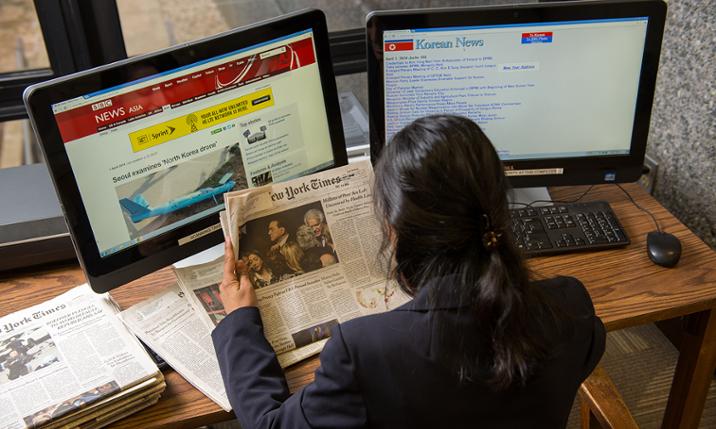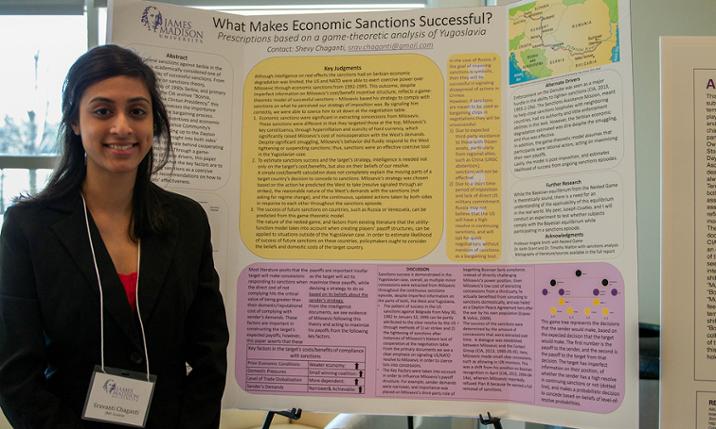Understanding the human element
Nation and World
SUMMARY: Shevy Chaganti ('14) says JMU provided a good foundation to further her ambition to apply an understanding of people, their psychology and motivations to solving conflicts.
International relations major Shevy Chaganti (’14) sees the value of a broader worldview

Advice that works
What’s the best advice you’ve ever been offered?
Sravanti “Shevy” Chaganti, an international relations major, has a ready answer to that question.
“It was a recommendation from one of my professors in political science, Dr. Manal Jamal,” Chaganti says. “Dr. Jamal said you should always look at multiple news sources because news is written from a perspective and a bias.”
'I want to be sure I have a holistic view of world events.'
Chaganti applies that advice daily. “Every morning I read the news from BBC, CNN and Al Jazeera just so I can get different perspectives. If there is a particular news item of interest from abroad—for instance something about North Korea—I also read a newspaper from that country. I want to be sure I have a holistic view of world events.”
Taking education to the next level
She is also enthusiastic about her recent opportunities as a research assistant for Bernd Kaussler, an associate professor of political science.
'I've gotten the opportunity to directly work with primary documents, to summarize vast amounts of real-world data....It's the kind of education that you don't necessarily get in the classroom.'
In advance of the Intelligence and the Transition from War to Peace conference at JMU, she researched recently declassified CIA documents on the Bosnian War of the 1990s, which were the focus of the conference.
“This year has really taken my education to the next level. I've gotten the opportunity to directly work with primary documents, to summarize vast amounts of real-world data. Dr. Kaussler has guided me to complete higher quality work while affording me enough space to be creative in research techniques. It's the kind of education that you don't necessarily get in the classroom.”

Applying game theory
Her poster presentation at the conference examined economic sanctions and their role in the coercive diplomacy leading to the Dayton Peace Accords. “My project took a game theory model and overlaid it on the events portrayed in the CIA documents,” she says. Chaganti has found a common denominator in the application of game theory and strategic critical thinking to national security issues and world affairs. “At the end of the day this is about human beings. Understanding people’s motivations and incentives is paramount,” she says, “and that’s what is most interesting to me.”
'I was able to see how intelligence professionals think and interact, and learn what the needs are in the industry.'
Gaining marketplace value
The experience had a two-fold benefit. “What was great about the conference was that it focused on a comprehensive, integrated understanding of the conflict.” In addition to broadening her worldview, she appreciates the marketplace value of the research and presentation experience. “The conference gave students a chance to see what the career field of intelligence analysis looks like from the inside,” she says. “I was able to see how intelligence professionals think and interact, and learn what the needs are in the industry. It was invaluable experience.”
Chaganti says JMU has provided a good foundation to further her ambition. “I want to apply an understanding of people, their psychology and motivations to solving conflicts.”
Learn more about the Madison Experience.
